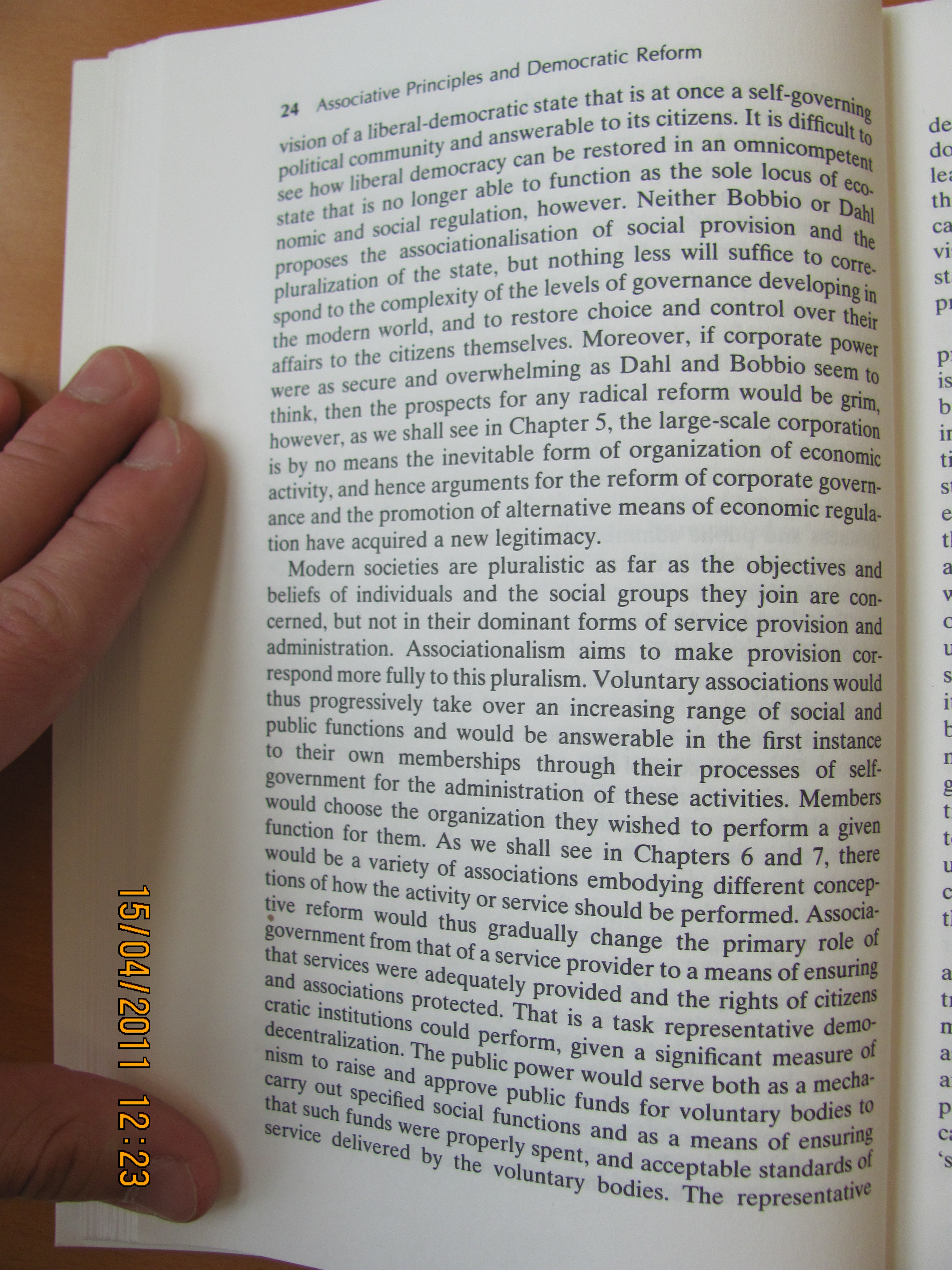40583 IMG#12

24 Associative Principles and Democratic Reform
vision of a liberal-democratic State that is at once a self-goveming politicai community and answerable to its citizens. It is difficultto see how liberał democracy can be restored in an omnicompetent State that is no longer able to function as the sole locus of eco-nomie and social regulation, however. Neither Bobbio or Dahl proposes the associationalisation of social provision and the pluralization of the State, but nothing less will suffice to corre-spond to the complexity of the levels of governance developingin the modern world, and to restore choice and control over their affairs to the citizens themselves. Moreover, if corporate power were as secure and overwhelming as Dahl and Bobbio seem to think, then the prospects for any radical reform would be grim, however, as we shall see in Chapter 5, the large-scale Corporation is by no means the inevitable form of organization of economic activity, and hence arguments for the reform of corporate govem-ance and the promotion of alternative means of economic regulation have acąuired a new legitimacy.
Modem societies are pluralistic as far as the objectives and beliefs of individuals and the social groups they join are con-cemed, but not in their dominant forms of service provision and administration. Associationalism aims to make provision cor-respond morę fully to this pluralism. Voluntary associations would thus progressively take over an inereasing rangę of social and public functions and would be answerable in the first instance to their own memberships through their processes of self-govemment for the administration of these activities. Members would choose the organization they wished to perform a given function for them. As we shall see in Chapters 6 and 7, there would be a variety of associations embodying different concep-tions of how the activity or service should be performed. Associa-tive reform would thus gradually change the primary role of govemment from that of a service provider to a means of ensuring that services were adeąuately provided and the rights of citizens and associations protected. That is a task representative democratic institutions could perform, given a significant measure of decentralization. The public power would serve both as a mecha-nism to raise and approve public funds for voluntary bodies to carry out specified social functions and as a means of ensuring that such funds were properly spent, and acceptable standards of service delivered by the voluntary bodies. The representative
de
d<\
lej
th
cal
vil
st
P1
P
is
b
in
tl
sfl
e
tl
a
v
c
l
s
ii
t
r
m
tl
tl
m
c
ti
a
ti
n
a
a
P
Cj
‘s
Wyszukiwarka
Podobne podstrony:
IMG#10 22 Associative Principles and Democratic Reform public power and of the devolved associationa
IMG#18 30 Associative Principles and Democratic Reform gain the upper hand and impose their view on
16826 IMG#30 42 Associative Principles and Democrau^. must be permissive and gradual, not prescripti
IMG#14 26 Associative Principles and Democratic Reform democratic naturę of the ‘primary association
IMG#20 32 Associative Principles and Democratic Reform Laski in ‘The Problem of Administrative Areas
IMG#08 20 Associative Principles and Democratic Reform yoluntary associations in order to do so. Ass
88880 IMG#28 40 Associative Principles and Democratic Reform democracy as communication have the adv
82043 IMG#22 34 Associaftve Principles and Democratic Reform contradśction with centralized, bureauc
83038 IMG#16 28 Associative Principles and Democratic Reform a pleni tude of power and the right to
więcej podobnych podstron